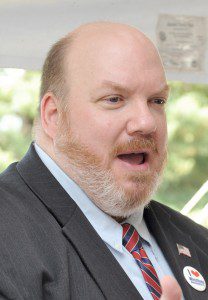WESTFIELD – State Treasurer and 2014 gubernatorial candidate Steve Grossman announced late last month that the Massachusetts State Lottery is set to rake in an estimated $971 million in profit this year, $34 million above projections for the fiscal year 2014, exceeding expectations for a third straight year.
The Massachusetts State Lottery is currently the largest source of unrestricted local aid for the state’s 351 cities and towns, and this year’s haul was second only to FY12’s $983 million in terms of total profit.
This would seem like good news for municipalities like Westfield, who has lost $1 million a year for the past five years according to At-large City Councilor Dan Allie.
A candidate for State Representative this fall, Allie recently put a question on the upcoming local fall ballot to ask the state to increase funding for road repairs and maintenance, as well as local aid, back to 2007 levels.
“When they created the lottery, it was revenue for the cities and towns and it still is, by state law, for education,” said Allie. “The state has taken about $700 million out of the lottery fund in the last five years.”
Allie said that the state cleared over $900 million in revenue above projections last year and could’ve easily left the lottery fund alone.
“In fact, it could’ve taken 10 percent of that surplus as another way to restore local aid,” he said, adding that he knew the state would have a surplus in revenue again this year. “The initial forecast was that it was going to be $20 million (above projections).”
Allie reiterated his belief that the state doesn’t have a revenue problem, but a spending problem.
“The point is that we’re paying for all of this and we’re not getting the services. People are buying lottery tickets and they’re thinking it’s going to the cities and towns for education,” he said. “The Governor wanted a billion dollar tax increase and the legislature only gave him half a billion. Then they reinstated tolls on the Mass Pike. That road has been paid for since I was four years old, many times over.”
Allie stated that, without an increase in local aid, hardworking people and seniors will be forced to take drastic actions like selling their homes.
“I wasn’t happy with the tax increase last year because they had such a significant surplus,” Allie said. “The real economy is when people can hang onto their money just a little bit longer – they buy things, they spend money. Otherwise they hunker down.”
“People don’t know that there is this significant surplus or that the states taking money out of the lottery fund,” he said. “Whether we’re talking about the transportation bond bill or the lottery fund, the money is in those funds – its just not coming back to the cities. The money is there, but the priorities aren’t.”
Regarding the chance that Westfield could see increased local aid in the next fiscal year, Westfield’s State Representative John Velis, who will face Allie again this fall in a rematch of last spring’s 4th Hampden District special election, believes the Whip City could snag a larger sliver of the pie.
“I think theres a very good chance, but of course, you have to go down there and make your case,” said Velis. “I have reason to believe that local aid levels will probably start to increase. They’ve been decreasing every single year, but I think leaders – the Speaker and Chair of Ways and Means – get it, and I think in the next couple of years, we’ll see local aid levels reverse direction.”
State Senator Don Humason, Jr (R-Westfield), who vacated the 4th Hampden seat Velis assumed last April, is cautious about whether the increase in lottery revenue will actually increase local aid.
“In a perfect world, it would increase, but I don’t know if I’m optimistic,” he said, adding that leadership in the House and Senate have “not been particularly friendly” to the causes of cities and towns in the Commonwealth.
“We, the legislature, have wanted to keep the revenue that is coming in and use it for state projects rather than sharing it with the cities and towns that have a claim on it,” Humason said. “The legislature will most likely pass a supplemental budget in informal session this month, maybe in September. But am I confident that there will be an increase in local aid? No.”
“The state legislature, from what I’m hearing, has their own opinion as to the schedule about local aid, so it has been recalibrated to a number set before 2008,” said Westfield Mayor Daniel M. Knapik. “Year over year, they’ll provide increases to the formula. But what the mayors are hearing is they’re not interested in revisiting levels of aid available before ’09.”
Knapik said that the legislature’s stance is that they’ve compromised enough.
“Their position has been ‘we gave you healthcare reform, we gave you the local option on meals and hotels’, and they’ve just got other issues and interests,” he said, adding that this will can only change from the Governor’s office.
“Governor Patrick said he was going to do something revolutionary to reduce property taxes in ’06. He never followed through with that, and part of that was the economy,” said Knapik. “But now that the state economy has returned, you really need a governor whose going to be an advocate for property taxes and local aid.”
Knapik said with the healing of the state economy has come a laissez-faire attitude from Massachusetts residents regarding property taxes.
“The high point of agitation over property taxes has kind of subsided. Across the Commonwealth, people feel better about the economy,” he said. “But I’m looking at the contracts now and the few units we’re negotiating with currently and, even if it’s consistent with what we’ve settled with before – like 5.5 percent over three years – theres no extra money to do anything.”
Knapik stated that robust local aid gives cities options to reduce property tax levees, maintain infrastructure, and pay employees in accordance with collective bargaining. With limited local aid, infrastructure suffers because of those collective bargaining agreements.
According to a release from the Massachusetts State Lottery, sales of $4.861 billion this past year topped the previous record, $4.850 billion, set last year. Over the last three fiscal years, lottery sales have totaled $14.453 billion, and recorded profits of $2.912 billion.
In comparison to FY11, sales for FY14 are up 9.8 percent ($433.4 million) and profits are up 9.5 percent ($84.0 million). The lottery spent an estimated $2.1 million less than it budgeted for administrative costs in FY14, money that was directly applied to the overall profit. According to the organization, the Mass. State Lottery’s administrative costs were the lowest of any U.S. lottery, and remained at approximately 2 percent of overall revenues.





